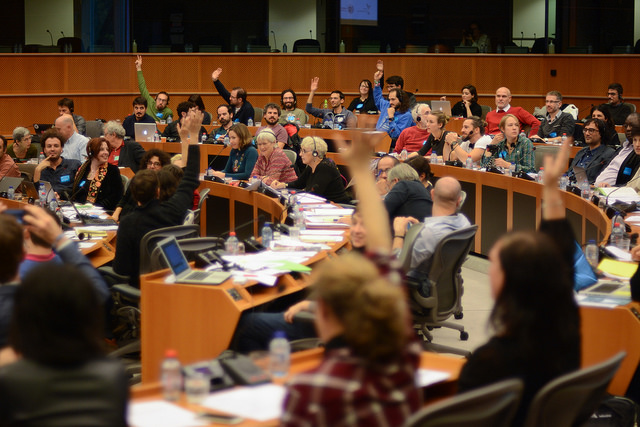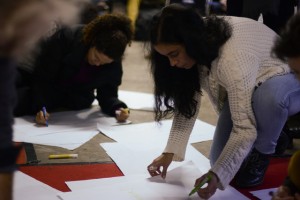 “No one can stop an idea whose time has come”, said Victor Hugo. This is the quote Nicolas Krausz, from Charles Leopold Mayer Foundation, chose to describe how powerful the European Commons Assembly (ECA) is as a political and organising process.
“No one can stop an idea whose time has come”, said Victor Hugo. This is the quote Nicolas Krausz, from Charles Leopold Mayer Foundation, chose to describe how powerful the European Commons Assembly (ECA) is as a political and organising process.
The first ECA took place in Brussels from November 15-17, 2016. More than 150 commoners from 20 European countries convened at the European Capital for a three-day programme including: strategic discussions on the emergence of a Pan-European Commoner Movement, participatory meeting with MEPs in the European Parliament, visits to Belgium Commons initiatives, policy proposals works, and debates.
EDGE members involved in the Commons Working Group brought financial and moral support to the ECA and will keep involved in this promising process. The group considers the Commons as: “an important answer to the democracy crisis, a way to provision all sorts of non-market means for meeting people’s needs and as a huge cultural shift in values from competition to cooperation. Participatory governance, post-capitalist economies, post-individualist worldview – the Commons provides a practical, non-ideological way of simultaneously addressing the failures of the neoliberal economy and the modern bureaucratic state, and their inability to meet ecological needs and assure social justice.”
Members of the EDGE Commons Working Group includes Heinrich Böll Foundation, Lunt Foundation, European Cultural Foundation, Charles Leopold Mayer Foundation and Foundation Terre Solidaire.
Read more in an article published by Sophie Bloemen & David Hammerstein on The Commons Network website:
 22 November 2016 – In the wake of Trump’s shocking victory and in the midst of a deep EU crisis accelerated by Brexit many commons activists around Europe have reacted with a sense of “Don’t mourn, commonify!”. The current economic order has left many behind, has alienated many from the establishment and in order to resist the old, we need to be actively building the new at the same time. For this there is a clear role for the European Union.
22 November 2016 – In the wake of Trump’s shocking victory and in the midst of a deep EU crisis accelerated by Brexit many commons activists around Europe have reacted with a sense of “Don’t mourn, commonify!”. The current economic order has left many behind, has alienated many from the establishment and in order to resist the old, we need to be actively building the new at the same time. For this there is a clear role for the European Union.
From the 15th to the 17th of November the 1st European Assembly of the Commons took place in Brussels over the course of 3 days.
For the first time commoners from around Europe met in the European Parliament in Brussels. Over 150 Europeans came to Brussels to discuss European politics, policy proposals and the protection of the commons. The aims: To establish new synergies, to show solidarity, to reclaim Europe from the bottom-up and, overall, to start a visible commons movement with a European focus. For the first time Europe´s democratically elected Members of the European Parliament exchanged views with a “Commons Assembly” made up of an explosively creative myriad of urban regenerators, knowledge sharers, energy cooperativists, community artists, food producers as well as disruptive social hackers of many different flavours.
